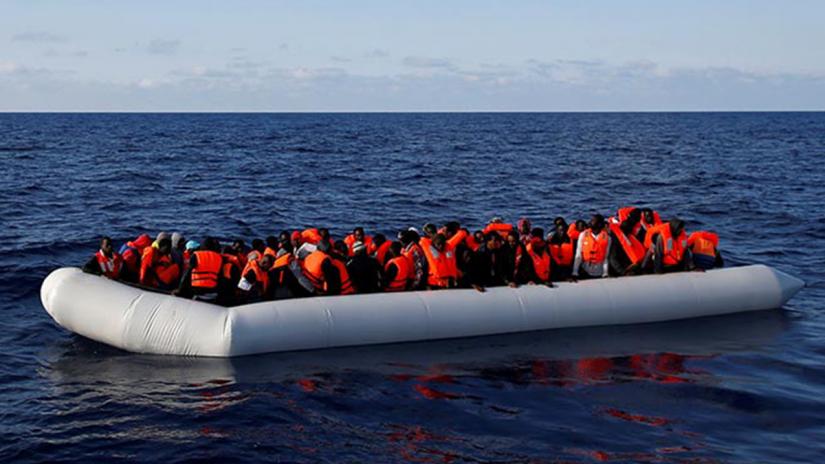 Seventeen out of the 64 Bangladeshis stranded off the coast of Tunisia have returned to the country.
Seventeen out of the 64 Bangladeshis stranded off the coast of Tunisia have returned to the country.
The Flight QR 634 of Qatar Airways carrying the migrants landed at the Hazrat Shahjalal International Airport in Dhaka around 5:15pm on Friday (Jun 21), said immigration sources.
The returnees are: Azad Rahman, Rasel Matubbar, Ladim Matubbar, Asman Matubbar, Rajib Matubbar, Piyar Ali, Jual Sejal, Azizul Islam from Madaripur district; Idris Jomaddar, Sahajul Kundu, Abu Bakkar Siddique, Niyamot Shikder, from Brahmanbaria district; Rafikul Islam from Noakhali district, Saiful Islam from Chandpur district, Rakib Hossain from Shariatpur district, Shipon Ahmed from Sunamganj district, and Jillur Rahman from Moulvibazar district.
Earlier a foreign ministry official said rest of the 47 people would be brought back in phases.
“Those Bangladeshis are being brought back with the help of International Organization for Migration in Tunisia,” said the official, who preferred to go unnamed.
Tunisia allowed dozens of migrants, mostly from Bangladesh, to disembark after three weeks stranded in the Mediterranean, so that they can return to their home countries.
They were on their way to Europe from Libya when the engine of the boat broke down. An Egyptian boat later rescued the migrants in Tunisian waters last month.
Among the group who set off from Libya, 64 are from Bangladesh while nine are Egyptians, one is Moroccan and one Sudanese, according to the Red Crescent said.
Libya's west coast is a frequent departure point for African migrants hoping to reach Europe by paying human traffickers. But their numbers have dropped after an Italian-led effort to disrupt smuggling networks and support the Libyan coastguard.
At least 65 migrants drowned last month when their boat capsized off Tunisia after setting out from Libya.
In the first four months of 2019, 164 people are known to have died on the route, a smaller number but a higher death rate than in previous years, with one dying for every three who reach European shores, the UN refugee agency UNHCR said.
 National
National
41474 hour(s) 56 minute(s) ago ;
Evening 09:51 ; Thursday ; Jul 10, 2025
17 Bangladeshis stranded off Tunisia return home
Send
Bangla Tribune Report
Published : 21:06, Jun 21, 2019 | Updated : 21:10, Jun 21, 2019
Published : 21:06, Jun 21, 2019 | Updated : 21:10, Jun 21, 2019
0 ...0 ...
/so/hb/
Topics: Top Stories
- KOICA donates medical supplies to BSMMU
- 5 more flights to take back British nationals to London
- Covid19: Rajarbagh, Mohammadpur worst affected
- Momen joins UN solidarity song over COVID-19 combat
- Covid-19: OIC to hold special meeting
- WFP begins food distribution in Cox’s Bazar
- WFP begins food distribution in Cox’s Bazar
- 290 return home to Australia
- Third charter flight for US citizens to return home
- Dhaka proposes to postpone D8 Summit
Unauthorized use of news, image, information, etc published by Bangla Tribune is punishable by copyright law. Appropriate legal steps will be taken by the management against any person or body that infringes those laws.
Bangla Tribune is one of the most revered online newspapers in Bangladesh, due to its reputation of neutral coverage and incisive analysis.
F R Tower, 8/C Panthapath, Shukrabad, Dhaka-1207 | Phone: 58151324; 58151326, Fax: 58151329 | Mob: 01730794527, 01730794528


